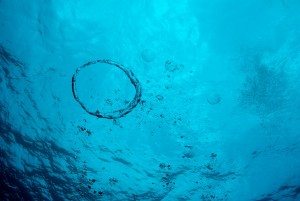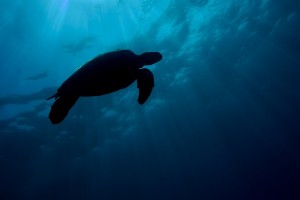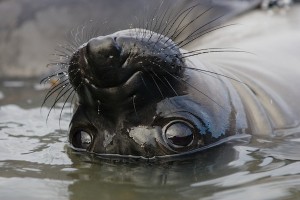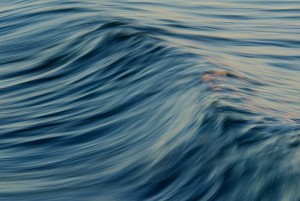[caption id="attachment_8864" align="pull-right" width="300" caption="© Neil Ever Osborne (www.neileverosborne.com)"] [/caption]
[/caption]
San Francisco, CA – Why do we seek respite at the ocean's shore? Why are the words "Ocean View" the most valuable in real estate? Why does the sound, smell, touch and taste of the sea set our souls at ease? These questions and much more was on tap, Thursday, June 2, 2011 as leaders in neuroscience and ocean exploration converge at the California Academy of Sciences for the first-ever BLUEMiND Summit.
BLUEMiND Summit is the brainchild of Dr. Wallace J. Nichols, a noted sea turtle biologist, ocean advocate and Research Associate at the California Academy of Sciences. He and a team of scientists and entrepreneurs have invested two years of thought and planning into this one-of-a-kind summit.
BLUEMiND is the only event ever to explore the intersection of brain and ocean. Bringing together neuroscientists, ocean scientists, experts in technology forecasting, photographers, explorers, writers, and ocean advocates, this unprecedented Summit will help define an emerging field that unites neuroscience, ocean exploration and stewardship, providing the first opportunity for participants to engage in this dialogue and to shape a new era of scientific understanding of the ocean and its great emotional power.

“Humans have a deep connection to the sea that drives many of our decisions—from what seafood we eat and where we live, to how we vacation and relax,” said Dr. Nichols. “But that connection is poorly studied and tricky territory of discussion among scientists and policy makers. So, I decided it was time to bring the mind and ocean together. The result is BLUEMiND. Understanding the connection between neuroscience and the ocean may shed new light on the best use of our brains to evolve our relationship to our ocean planet.”
With ongoing threats to the ocean intensifying, there is urgent need to focus on solutions. Nichols and his team believe that new insights may emerge as we understand our brains more deeply—and most critically, our brain’s interrelationship with the ocean planet.
Little data exists about the brain ‘on the ocean’ either in the field of cognitive neuroscience, or the oceans community. What happens to the brain when a person is in proximity to the ocean? Why do we spend hard earned money to vacation, live or dine within the view or sound-shed of the sea? What are the links between the ocean, relaxation, stress and public health? BLUEMiND will provide a platform for leaders to discuss, debate and better understand these interconnections, and the interrelated state of the “brain on ocean," and will support further exploration of the implications for ocean and human health.

“The goals of the BLUEMiND Summit are to jumpstart several new lines of mind and ocean research and add a new tool to our ocean conservation toolbox,” say Nichols.
The daytime invitation-only Summit was livecast to the public free of charge at www.justin.tv/calacademy. The summit then spilled over into the California Academy of Science’s 4,000-person NightLife Ocean evening celebration including a Mind and Ocean session in the planetarium with Dr. Philippe Goldin, a Stanford University neuroscientist, Dr. Nichols, and writer Julia Whitty. For program details and further information on BLUEMiND, please visit www.mindandocean.org
BLUEMiND QUOTES:
Speakers at the event included trailblazers in a variety of fields including neuroscience, culinary arts, yoga, ocean conservation academia, dance and more. Provided below are quotes from speakers:
Speaker Jaimal Yogis, author of Saltwater Buddha, reflects: “Spending so many of my days in the ocean, I've always thought that it's a perfect metaphor for the human mind: unhindered, wild, at times violent, while at the same time profound, serene, and playful. All life comes from the sea, and human consciousness still reflects that. It's exciting to be part of an event that honors that connection. I think we're just beginning to tap the knowledge of the sea.”

“As a clinical neuroscientist, it is clear to me that the mind-brain and the ocean are two vast dynamic organic domains,” explained Dr. Philippe Goldin, Research Psychologist at Stanford University. “Both are complex and intriguing, and they require our attention and care for their continued well-being and existence.”
"I've always been drawn to the ocean. It's interesting to know there may be a neurological basis for that attraction. But perhaps more importantly, if we can use that connection to help people become connected to the ocean in a meaningful way that translates to better stewardship, hallelujah!" -Mark Shelley, Executive Director, Sea Studios Foundation
"My father, who spent months at a time away from us while he was under the sea (in submarines). When home he often repeated, 'Just plain old water, it's the most valuable thing we have and we don’t even know it. When we do, you’ll see wars being fought over it.' His passion had a profound impact on us ... and, it was absolutely an influence that would eventually prove the vital ingredient in the artificial intelligences and virtual worlds we would create in the decades to come. BLUEMiND is like a homecoming for me—finally, we're engaging a most overdue conversation for our time: the brain and the ocean." -Lorne Lanning, Game Designer, OddWorld and OddMobb
BLUEMIND: Your Brain On Ocean is being held June 2nd, 2011 at the California Academy of Sciences. Watch and listen live online at MindandOcean.org
